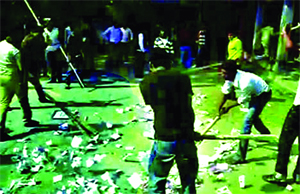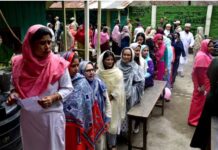Sadeq Khan
An uneasy calm has descended on Bangladesh. The shock of daring ‘vote dacoity’ and violent exclusion of voters from polling centres brandishing and using fire-arms and lethal weapons right in front of the eyes of law-enforcement agencies (some police officers themselves engaged in voter intimidation throwing out voters and helping ruling party agents to seal most ballot papers and stuff ballot boxes idly watched by colluding polling officers) in the five stages of upozilla elections has left the mofussil public in particular in a state of stupor.
In the big cities and their suburbs, government repression of opposition activists, their arrests on trumped-up charges, and abductions followed by extra-judicial killings of opposition elements, well-known or unknown, had gone on through the six weeks of upozilla polls. Criminal gangs contracted by ruling party candidates to carry out voter intimidation are having their hey-day all over Bangladesh as their pay-off, sections of the police joining with them in their crime-sheet acts or sharing their loot anyway for overlooking such acts. March 31, the last day of the staggered upozilla polls was supposed to be a terminal date after which the mainstream opposition promised to assess the public mood, regroup their forces on the ground and begin their political counter-offensive against ruling party excesses of misappropriation, misfeasance and state terror to enforce a dialogue for modalities and schedule of a fresh general election. Public mood is aghast at the indifference of the party-in-power to the sorry plight of social order and of the national economy, the ministers and high officials of the government remaining nonetheless engaged in revelries and celebrations, wasting crores of public donations in hosting international events and earning a mention in Guinness World Records. So far the mainstream opposition has not come forward with any coherent plan action beyond war of words in public debate over credits for the declaration of independence and the war of liberation.
Ali Riaz, Professor and Chair of the Department of Politics and Government at the Illinois State University, USA, in an article in the April edition of Current History on the “Crisis of Democracy in Bangladesh” has contended that the political crisis as prevailing in Bangladesh after the one-sided January 5 elections to stage a return to power of the incumbents with a more naked authoritarian agenda is in fact encouraging Islamic extremists for a covert come-back to Bangladesh politics with their terrorist ways as the only effective option against the tyranny of one-party rule. Analysing the results of upozilla polls in which candidates put up by the Jamaat-e-Islami (and of course the BNP) were declared elected in a substantial number of seats despite the hurdles of a highly partisan election administration, state-sponsored violence and abuse of the process of law for suppressing opposition candidates, Ambassador William B. Milam, now a senior scholar at the Woodrow Wilson International Center in Washington, USA, came to a different conclusion.
After reading Ali Riaz in Current History, Milam wrote in The Express Tribune of 8 April, 2014 issue as follows:
“The political box into which the country’s political leaders have dragged it will undoubtedly erode the enormous economic gains made by Bangladesh in the past two decades, in part by releasing political forces that have been bottled up or latent for many decades. The one-party government (the opposition is bought and paid for) has thrown aside what clearly the great majority of the populace saw as its mandate: to come to an agreement with the opposition that will produce a credible second election and end the egregious violence.
“The Awami League (AL) government appears to have chosen to ignore popular will and to be planning to stay in office without an election until 2019. Signs of this include the government doing its best to marginalise the main opposition by continuing to arrest its leaders, denying space for any political opponent to protest peacefully (media supporters of the opposition are being silenced or threatened). Pro-regime intellectuals are calling for a ‘democratic dictatorship’ (an oxymoron that we have heard before from authoritarian regimes around the world), human rights abuses are increasing (especially enforced disappearances and extrajudicial murder), and AL party leaders are thumping their chest over wins in the later rounds of local elections despite their overt ballot stuffing.
By 2019, at the rate these things are proceeding, there will not be much of the regular opposition left to run against a powerful AL-controlled government. Nor will a civil society third force, the much-talked about and hoped-for panacea of the liberal secular centre-right, develop in such an atmosphere. And if threatened, the AL might proceed to the next logical step, i.e. a one-party state to eliminate any possibility of an opposition. Interestingly enough, the AL came to power (and was supported by India) on its platform of ridding the country of extremism. But Riaz (along many other observers) believe that the government’s clearly authoritarian mindset and increasingly authoritarian actions, will ‘encourage the extremists’.
“There remain some extremist (militants) in Bangladesh, and the government’s actions will surely stir them up and add to their recruiting message. But there are extremists that are not militants, and they are not just more numerous, but also more dangerous. These are the extremists within political parties — both major parties — who will drive their leaders to more extreme measures in order to keep the government in power or to bring the government down (extremists in the opposition party who may be driven underground) and may see no other option but the use of increased violence to do so.”
Thus Milam finds it unlikely that ‘Islamic terrorism’ will find root in the Sufi-oriented and democratic-minded Bangladesh. He thinks instead that the Awami League, in effect, is rejuvenating its sworn enemy as its ultimate challenger for power by stronger appeal to the electorate:
“Ironically, it is the party that the AL has sworn to destroy that may be its biggest threat. The Bangladesh Jamaat-e-Islami (BJI) is waiting in the wings. Its reputation for honest and efficient governance is drawing Bangladeshis who are fed up with the corruption and nepotism of the major parties, and it made surprising gains in the early rounds of the local elections before the ballot-box stuffing started. One wonders whether a reborn, renamed, reformed BJI, if able to shed its collaboration image, might turn into the centre of the opposition. I do not believe that its scriptural philosophy would appeal to the bulk of Bangladeshi voters, but if this renamed party ran on a platform of efficient and honest government, it might sweep the table. I hear that some of those Bangladeshis who oppose the AL government are asking already: Where else could we go?”
There are also other Bangladeshis who still believe that the only solution of the political crisis in Bangladesh, as the politicians have failed, is in a military solution, which is inevitable since the crisis has already assumed a sort of geopolitical dimension involving global and regional powers. They point out that over the past few years, a chasm has grown between India and the US (and the EU to some extent) with respect to South Asia outlook. The western countries supported a democratic transition in Bangladesh where elections reflect the choice of the people of Bangladesh. India’s unconditional support for a brutal undemocratic regime in Bangladesh is influencing Western countries, especially the US, to rethink their earlier Bangladesh policy of looking at South Asia through the prism of India. And they quote the posting of Bangladesh by the International Crisis Group amongst the top ten areas of conflicts to watch in 2014. (vide Louise Arbour, “Next Year’s Wars”, Foreign Policy, 30 Dec., 2013).
Bangladesh situation is considered dangerous and so tendentious as may flare up into a regional crisis. The International Crisis Group noted that the opposition Bangladesh National Party boycotted the elections, accusing the ruling Awami League of authoritarian rule and of plans to rig the polls. The boycott deepened the crisis and led to more deadly violence. More than half the constituencies had no contest and in the remaining seats, voter turnout was poor. The election was considered unacceptable by the international community. But rivalries for elective power aside, the roots of Bangladeshi political polarization run deep. Over the past two years, a government-appointed tribunal has carried out profoundly flawed trials for war crimes committed during the country’s 1971 war of liberation from Pakistan. To date, everyone on trial is a Bangladeshi citizen. No one from the Pakistani military, the main force resisting the liberation of what was then East Pakistan, has been indicted. Making matters worse, the sentencing to death of six members of the BNP and Islamist Jamaat-e-Islami parties — for allegedly trying to sabotage the country’s formation — has inflated religious-versus-secular social divisions and spawned the radicalization of newer groups like Hefajat-e-Islam. The only way out is via credible elections and a stable, responsive government, for which there is no consensus nor any inclination to compromise. The risks are manifold. Since 1971, the military has attempted some 30 coups, about a fifth of them successful. In two, heads of governments were assassinated, including Sheikh Hasina’s father. Today, the military remains a risk. Finally, the potential radicalization of Rohingya refugees, human rights concerns, and Bangladesh’s complicated economic trajectory all make for an explosive mix.
Source: Weekly Holiday










